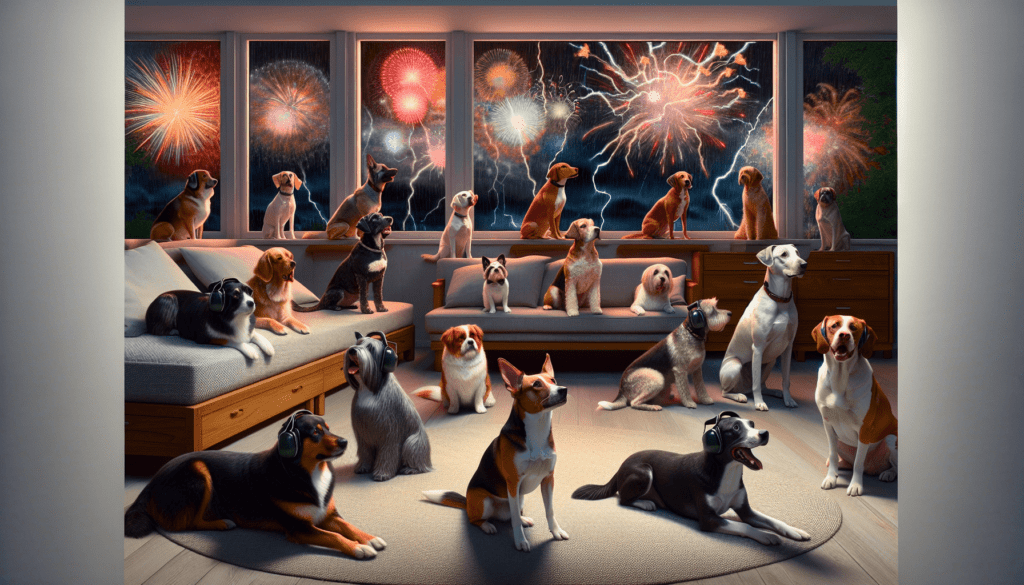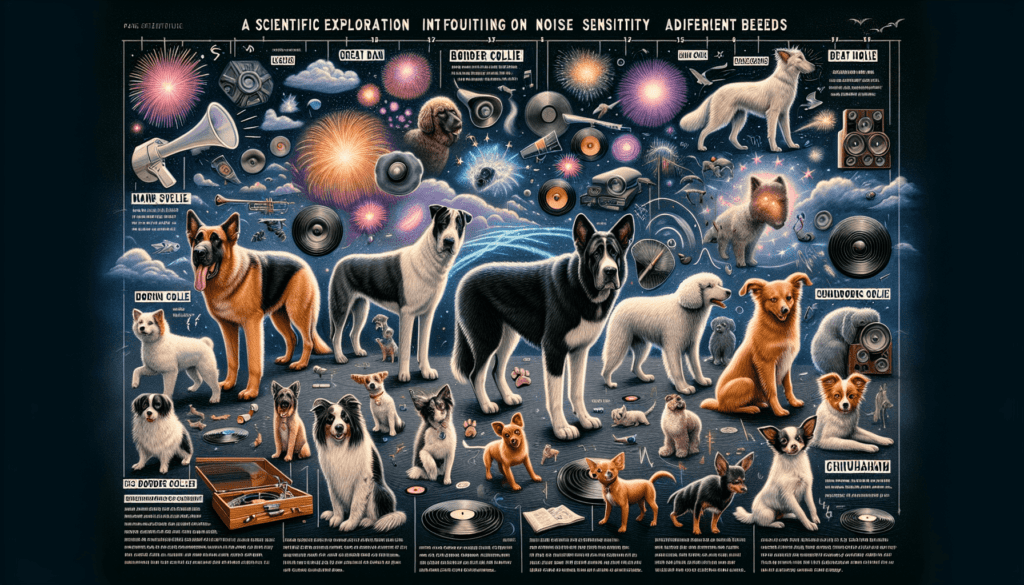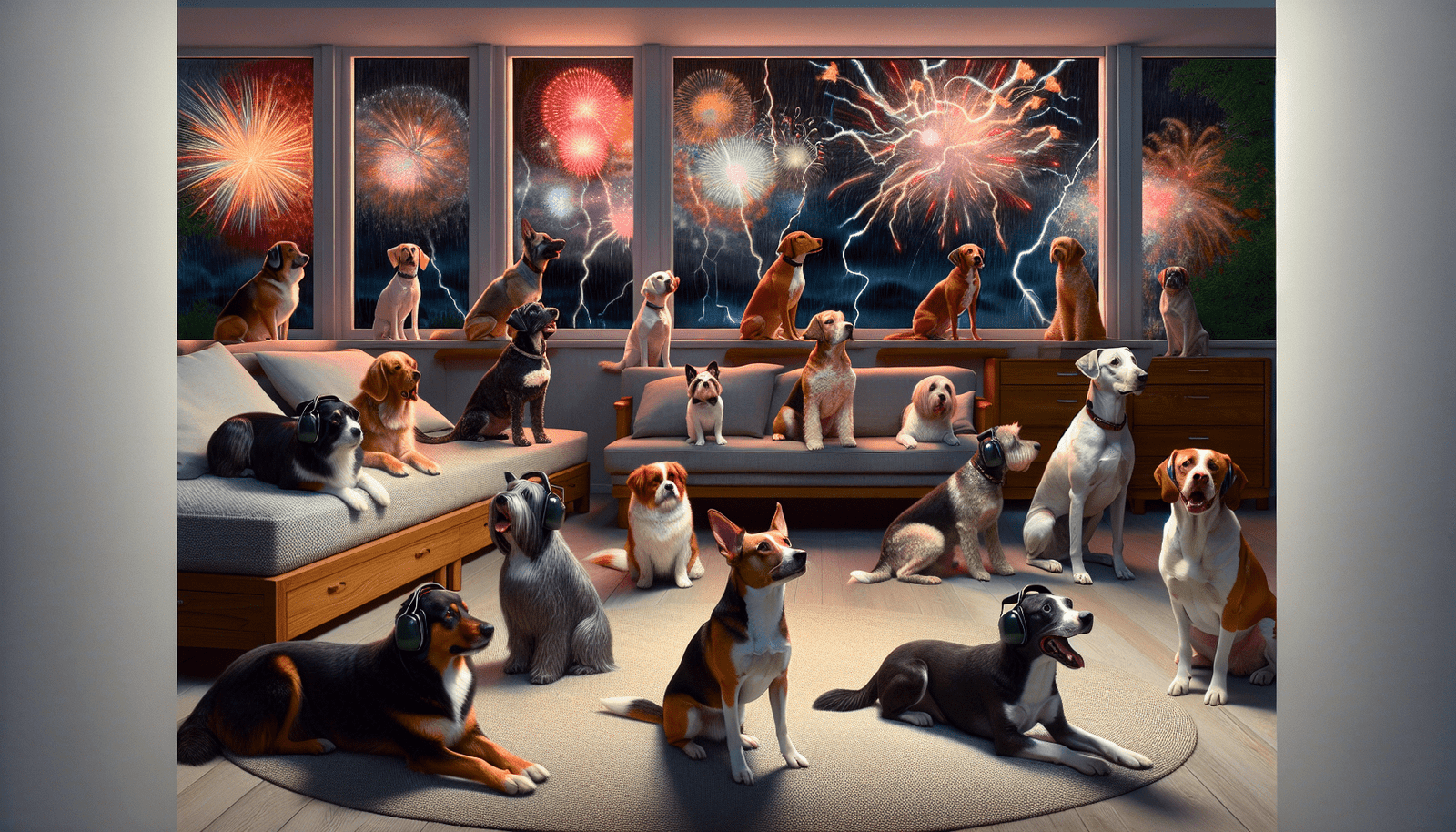If you’ve ever witnessed your furry friend trembling or hiding during a thunderstorm or fireworks, you may have wondered if certain breeds are more susceptible to noise anxiety. The answer is yes – some dogs are more prone to experiencing anxiety in response to loud sounds. Whether it’s the booming thunder or the ear-piercing crackle of fireworks, certain breeds may find themselves more susceptible to feeling stressed and fearful in these situations. In this article, we’ll explore the breeds and types of dogs that are more prone to noise anxiety, shedding light on why some pups may be more affected than others. So, if your pup gets jumpy at the sound of a balloon pop or a car backfire, keep reading to learn more about noise anxiety and its connection to specific breeds.

Understanding Noise Anxiety in Dogs
Noise anxiety, also known as fear of noises, is a common condition that affects many dogs. It is characterized by an intense fear or anxiety response to certain loud or unfamiliar sounds. These sounds can include fireworks, thunderstorms, sirens, or even everyday household noises like the vacuum cleaner or blender.
Causes of Noise Anxiety
There are several factors that can contribute to noise anxiety in dogs. While the exact cause may vary from dog to dog, some common causes include:
-
Genetics and breed predisposition: Certain breeds are more prone to developing noise anxiety due to genetic factors. These breeds may have a heightened sensitivity to sound or be more prone to anxiety in general.
-
Environment and early socialization: Dogs that have not been properly exposed to a variety of sounds during their early developmental stages may be more likely to develop noise anxiety. A lack of early socialization can make dogs more sensitive to unfamiliar noises.
-
Previous traumatic experiences: Dogs that have had negative experiences with loud or sudden noises in the past may develop a fear or anxiety response to similar sounds in the future. Traumatic experiences can leave a lasting impact on a dog’s behavior and emotional well-being.
-
Lack of exposure to different noises: Dogs that have had limited exposure to a range of different noises may be more susceptible to developing noise anxiety. Exposure to different sounds during puppyhood can help desensitize dogs to loud noises and reduce the risk of anxiety.
Symptoms of Noise Anxiety
Noise anxiety can manifest in a variety of ways in dogs. Some common symptoms include:
-
Excessive vocalization: Dogs with noise anxiety may bark, howl, or whine excessively when they encounter loud or unfamiliar sounds.
-
Pacing and restlessness: Dogs may exhibit pacing or restless behavior when they are exposed to triggering noises.
-
Destructive behavior: Noise anxiety can lead to destructive behavior, such as chewing on furniture or destroying household items.
-
Hiding or seeking shelter: Dogs may attempt to hide or find a safe place to seek shelter when they are anxious about loud noises.
-
Excessive drooling or panting: Anxiety can cause dogs to drool excessively or pant heavily, even in the absence of physical exertion.
-
Escaping or running away: In extreme cases, dogs with noise anxiety may try to escape from their environment in an attempt to avoid triggering sounds.
How Noise Anxiety Affects Dogs
Noise anxiety can have a significant impact on a dog’s overall well-being. The constant fear and stress associated with noise anxiety can lead to:
-
Poor quality of life: Dogs with noise anxiety may experience a diminished quality of life due to their constant fear and anxiety. They may struggle to enjoy everyday activities and may become fearful or reactive in various situations.
-
Health issues: Chronic stress and anxiety can have physical effects on a dog’s health, including digestive issues, weakened immune system, and an increased risk of developing other behavioral problems.
-
Strained owner-pet relationships: Dealing with a dog with noise anxiety can be challenging for owners. The constant need for reassurance and management strategies can strain the bond between the owner and their pet.
-
Safety concerns: Dogs with noise anxiety may engage in destructive or escape behaviors, which can put them at risk of injury or getting lost.
Factors Influencing Noise Anxiety in Dogs
Several factors can influence the development and severity of noise anxiety in dogs. Understanding these factors can help owners identify potential risks and take appropriate measures to manage their dog’s anxiety. Some key factors include:
-
Genetics and breed predisposition: Certain breeds are more genetically predisposed to noise anxiety. For example, breeds with a naturally heightened sense of smell or hearing, such as the Border Collie or German Shepherd, may be more prone to developing noise anxiety.
-
Environment and early socialization: A dog’s environment and early socialization experiences play a crucial role in shaping their reaction to noises. Dogs that have been exposed to a variety of sounds during their puppyhood are more likely to develop resilience and a reduced risk of noise anxiety.
-
Previous traumatic experiences: Dogs that have had negative or traumatic experiences with noises in the past may have an increased likelihood of developing noise anxiety. These experiences can leave a lasting impact on a dog’s psychological well-being and make them more sensitive to similar sounds in the future.
-
Lack of exposure to different noises: Dogs that have limited exposure to various noises during their critical developmental stages may be more vulnerable to noise anxiety. Early and positive exposure to different sounds can help desensitize dogs and build their confidence in dealing with loud or unfamiliar noises.
Breeds Prone to Noise Anxiety
While noise anxiety can affect dogs of all breeds and sizes, there are certain breeds that tend to be more prone to developing this condition. These breeds typically have heightened sensory perception or anxiety tendencies. Here are some examples:
-
Breeds known for noise sensitivity: Breeds that are known for their sensitivity to noises include the Border Collie, German Shepherd, Shetland Sheepdog, and Australian Shepherd.
-
Examples of breeds prone to noise anxiety: Other breeds that are commonly associated with noise anxiety include the Chihuahua, Yorkshire Terrier, Pomeranian, Labrador Retriever, Golden Retriever, and Boxer.
-
Factors contributing to breed-specific anxiety: Breed-specific characteristics, such as a strong prey drive or heightened sensory perception, can contribute to a breed’s susceptibility to noise anxiety. Additionally, a dog’s individual temperament and past experiences with noises can also play a role.

Small Breeds and Noise Anxiety
Small breed dogs are not immune to noise anxiety. In fact, some small breeds may be more prone to developing noise anxiety due to their size and temperament. Here are a few examples:
Chihuahuas and noise anxiety
Chihuahuas are known for their alertness and sensitivity to their environment. Their small size and often highly strung temperament make them susceptible to noise anxiety. They may react strongly to sudden or loud noises, exhibiting signs of fear or distress.
Yorkshire Terriers and noise anxiety
Yorkshire Terriers, or Yorkies, are often described as confident and intelligent dogs. However, they can also be sensitive to noises and may become anxious or fearful in the face of loud or unfamiliar sounds. Early socialization and exposure to different noises are crucial for helping Yorkies develop resilience.
Pomeranians and noise anxiety
Pomeranians are known for their vibrant personalities and strong personalities. However, they are also prone to anxiety, including noise anxiety. Pomeranians may exhibit restlessness, barking, or hiding behavior when exposed to triggering sounds.
Other small breeds prone to noise anxiety
While Chihuahuas, Yorkshire Terriers, and Pomeranians are commonly associated with noise anxiety, other small breeds, such as Shih Tzus, Maltese, and Dachshunds, may also be prone to developing this condition. It is essential for owners of small breeds to provide proper socialization, positive experiences with noises, and a calm and supportive environment to minimize the risk of noise anxiety.
Large Breeds and Noise Anxiety
Contrary to popular belief, noise anxiety is not limited to small breeds. Several large breeds can be susceptible to this condition as well. Here are a few examples:
German Shepherds and noise anxiety
German Shepherds are highly intelligent and often used as working dogs. However, their sensitivity to noises is well-documented. German Shepherds can become anxious or reactive when exposed to loud or unfamiliar sounds, and they may require specialized training to manage their noise anxiety effectively.
Labrador Retrievers and noise anxiety
Labrador Retrievers are known for their friendly and outgoing temperament. However, they can also be prone to noise anxiety, especially if they have had negative experiences with loud noises in the past. Proper socialization and positive reinforcement training techniques are essential for helping Labradors cope with their anxiety.
Golden Retrievers and noise anxiety
Like Labrador Retrievers, Golden Retrievers are typically sociable and eager to please. However, they can be susceptible to noise anxiety, especially if they have been inadequately socialized or exposed to triggering sounds during their early development. Creating a safe and calm environment for Golden Retrievers can help alleviate their anxiety.
Other large breeds prone to noise anxiety
While German Shepherds, Labrador Retrievers, and Golden Retrievers are commonly associated with noise anxiety, other large breeds, such as Boxers, Great Danes, and Bernese Mountain Dogs, may also be prone to developing this condition. It is important for owners of large breeds to provide proper socialization, positive experiences with noises, and a supportive environment to minimize the risk of noise anxiety.
Working Dog Breeds and Noise Anxiety
Working dog breeds are known for their intelligence, trainability, and ability to perform various tasks. However, these traits do not make them immune to noise anxiety. Here are a few examples of working dog breeds that may be prone to noise anxiety:
Border Collies and noise anxiety
Border Collies are highly intelligent and energetic dogs. While they excel in various dog sports and working activities, they can be prone to noise anxiety. Border Collies may be sensitive to loud or sudden noises and may exhibit fearful or avoidance behavior when exposed to such sounds.
Australian Shepherds and noise anxiety
Australian Shepherds are known for their agility and versatility. However, they can also be sensitive to noises and may become anxious or fearful in certain situations. Early socialization and positive reinforcement training are important for helping Australian Shepherds cope with noise anxiety.
Boxers and noise anxiety
Boxers are known for their playful and affectionate nature. However, they can also be prone to noise anxiety, especially if they have had negative experiences with loud or sudden noises in the past. Creating a safe and calm environment for Boxers, and using positive reinforcement techniques, can help alleviate their anxiety.
Other working dog breeds prone to noise anxiety
While Border Collies, Australian Shepherds, and Boxers are commonly associated with noise anxiety, other working breeds, such as Doberman Pinschers, Rottweilers, and Belgian Malinois, may also be prone to developing this condition. It is important for owners of working dog breeds to provide proper socialization, early exposure to different noises, and positive training techniques to reduce the risk of noise anxiety.
Herding Dog Breeds and Noise Anxiety
Herding dog breeds are known for their intelligence, agility, and herding instincts. However, these breeds can also be susceptible to noise anxiety. Here are a few examples:
Corgis and noise anxiety
Corgis are small herding dogs with big personalities. While they are generally confident and sociable, they can still be affected by noise anxiety. Corgis may exhibit fearful or reactive behavior when exposed to loud or sudden noises, and they may require training and management strategies to alleviate their anxiety.
Shetland Sheepdogs and noise anxiety
Shetland Sheepdogs, or Shelties, are known for their intelligence and loyalty. However, they can be sensitive to noises and may become anxious or fearful in certain situations. Adequate socialization, positive reinforcement training, and a calm environment can help Shelties cope with their noise anxiety.
Collies and noise anxiety
Collies, including the Rough Collie and Border Collie, are often associated with their herding abilities and intelligence. However, they can also be prone to noise anxiety. Collies may exhibit signs of fear or distress when exposed to loud or unfamiliar sounds, and owners should provide proper training and support to help them overcome their anxiety.
Other herding dog breeds prone to noise anxiety
While Corgis, Shetland Sheepdogs, and Collies are commonly associated with noise anxiety, other herding breeds, such as Australian Cattle Dogs, Australian Kelpies, and Old English Sheepdogs, may also be prone to developing this condition. Early socialization, positive reinforcement training, and creating a secure environment are crucial for minimizing the risk of noise anxiety in herding dogs.
Toy Breeds and Noise Anxiety
Toy breeds, characterized by their small size and often outgoing personalities, are not exempt from noise anxiety. In fact, some toy breeds may be more susceptible to noise anxiety due to their size and heightened sensitivity. Here are a few examples:
Poodles and noise anxiety
Poodles are known for their intelligence and versatility. However, they can also be prone to noise anxiety, especially if they have been inadequately socialized or exposed to triggering sounds during their early development. Positive reinforcement training and a calm environment can help Poodles cope with their anxiety.
Maltese and noise anxiety
Maltese dogs are often described as affectionate and lively companions. However, they can be sensitive to noises and may become anxious or fearful in certain situations. Proper socialization, exposure to different sounds, and a supportive environment are important for managing noise anxiety in Maltese dogs.
Cavalier King Charles Spaniels and noise anxiety
Cavalier King Charles Spaniels are known for their friendly and affectionate nature. However, they can also be prone to noise anxiety, especially if they have had negative experiences with loud or sudden noises in the past. Owners should provide a calm and secure environment for Cavalier King Charles Spaniels, and positive reinforcement training can help alleviate their anxiety.
Other toy breeds prone to noise anxiety
While Poodles, Maltese, and Cavalier King Charles Spaniels are commonly associated with noise anxiety, other toy breeds, such as Chihuahuas, Pomeranians, and Shih Tzus, may also be prone to developing this condition. It is important for owners of toy breeds to prioritize socialization, positive reinforcement training, and a supportive environment to reduce the risk of noise anxiety.
Mixed Breed Dogs and Noise Anxiety
Noise anxiety can affect dogs of any breed, including mixed breed dogs. While genetics can play a role in a dog’s predisposition to noise anxiety, there are several other factors that can influence anxiety levels in mixed breed dogs.
Factors influencing anxiety in mixed breed dogs
In mixed breed dogs, genetics from different breeds can interact in unique ways, making it difficult to predict the likelihood of noise anxiety. However, several factors can influence anxiety levels in mixed breed dogs, including their early socialization experiences, past traumatic events, and overall temperament.
If a mixed breed dog has significant genetic contributions from breeds known for their noise sensitivity, such as Border Collies or German Shepherds, they may be at an increased risk of developing noise anxiety. However, proper socialization, positive training techniques, and a supportive environment can help manage and minimize anxiety in mixed breed dogs.
How to identify noise anxiety in mixed breed dogs
Identifying noise anxiety in mixed breed dogs can be similar to recognizing it in purebred dogs. Look for symptoms such as excessive vocalization, pacing or restlessness, destructive behavior, hiding or seeking shelter, excessive drooling or panting, and attempts to escape or run away.
It is important for owners to familiarize themselves with their dog’s behavior and reactions to different noises. If a mixed breed dog consistently exhibits signs of anxiety or fear in response to loud or unfamiliar sounds, it is advisable to seek professional help to confirm the presence of noise anxiety and develop a management plan.
Conclusion
Noise anxiety is a common condition that can significantly impact a dog’s well-being and quality of life. It can affect dogs of all breeds and sizes, although certain breeds may be more prone to developing noise anxiety due to their genetics or other factors.
Recognizing the signs and symptoms of noise anxiety is essential for providing appropriate care and support for affected dogs. Additionally, understanding the factors that can contribute to noise anxiety, such as genetics, environment, and previous traumatic experiences, can help owners take proactive measures to prevent or manage this condition.
Management strategies for noise anxiety can include creating a calm and secure environment, using positive reinforcement training techniques, providing mental and physical stimulation, and seeking professional help when needed. With the right support and care, dogs with noise anxiety can lead happier and less stress-filled lives.

